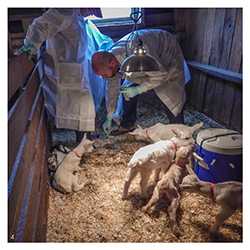NCEZID: Responding To Outbreaks
Perhaps what NCEZID is best known for is responding to outbreaks of infectious disease. Here are a few large-scale responses that NCEZID has led since 2010:
- 1st outbreak of Zika virus in the Western Hemisphere, which was linked to birth defects
- Largest Ebola epidemic in history, which killed more than 11,000 people
- Fungal meningitis outbreak caused by contaminated steroid injections
- 2nd-largest outbreak of West Nile virus infections that sickened 5,600 people in the US
- Outbreak of cholera in Haiti, which killed at least 10,000 people
NCEZID provides rapid assistance to states and foreign ministries of health through formal requests called epidemic-assistance investigations, or Epi-Aids. Each year, NCEZID conducts almost half (~25) of all CDC’s Epi-Aid investigations of outbreaks—large and small, domestic and international. Recent examples of Epi-Aids and other outbreak investigations that NCEZID participated in include:
- E. coli (Escherichia coli) infections among children who visited a goat farm in Connecticut
- Emerging, drug-resistant fungal infections (Candida auris) that spread among patients in healthcare settings
- Rarely seen bloodstream infections (Elizabethkingia) in patients in Wisconsin
- Illness caused by E. coli-tainted flour that infected people in more than 20 states
- Listeria bacteria in packaged salads that hospitalized 19 people, killing 1
We work to protect Americans from well-known outbreaks (Ebola) to outbreaks you’re more likely to encounter—like Salmonella food poisoning.
- Page last reviewed: August 28, 2017
- Page last updated: August 28, 2017
- Content source:
Centers for Disease Control and Prevention
National Center for Emerging and Zoonotic Infectious Diseases (NCEZID)


 ShareCompartir
ShareCompartir
